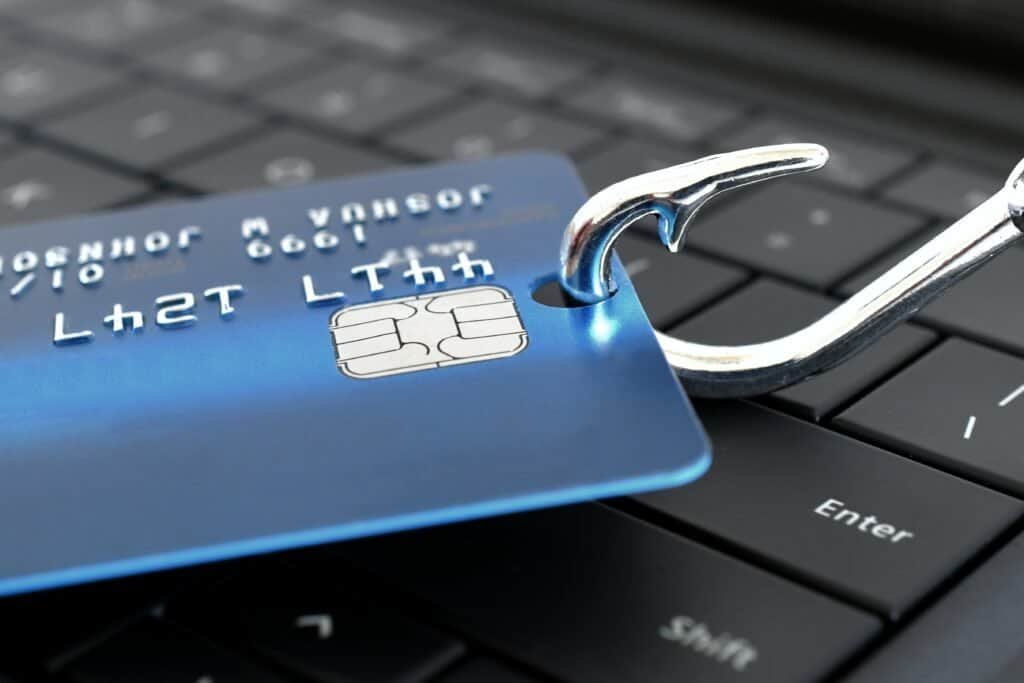Protect Yourself: The Most Common TikTok Scams of 2024

We may earn a small fee from the companies mentioned in this post.
With over a billion users, TikTok has taken the world of social media, by storm, becoming one of the most popular social media platforms today. However, its immense popularity has also led to a surge in ticktoc scams targeting unsuspecting users.
In this blog post, we will explore the most common TikTok scams of 2024, help you recognise and avoid ticktoc scams, and teach you how to protect your own account details and personal information.
Key Takeaways
TikTok scams are on the rise, including bot accounts, counterfeit products, romance scams and phishing.
Be aware of warning signs such as misspelled profile names and verification badges to protect yourself.
Report scammers quickly and use strong passwords with two factor authentication for extra security.
The Rising Threat of TikTok Scams

As TikTok continues to draw in users of all ages, the platform has become a breeding ground for various types of online scams. From counterfeit products to romance scams, TikTok users need to be increasingly vigilant to protect themselves and their accounts from being targeted by scammers.
One of the most prevalent types of fraud on TikTok is the use of bot accounts, including bot accounts TikTok, to impersonate genuine users. These fraudulent accounts often promote counterfeit goods, promising attractive deals from well-known brands fake celebrities, only to deliver low-quality knockoffs or nothing at all.
In addition click links to counterfeit products, the most common TikTok scams include romance scams, adult content scams, and phishing scams, all designed to deceive and exploit unsuspecting users.
Spreading awareness about the various scams targeting TikTok users and educating them on account and personal information protection can effectively combat these growing threats. Some measures users can take to ensure the legitimacy of sellers and keep their accounts secure include checking for the blue checkmark from TikTok Shopping, consulting reviews for scam warnings, and only purchasing from reputable retailers that are recognized.
Should a user unfortunately fall victim to a TikTok scam, immediate action is necessary to further identity theft and minimize the damage. This may involve contacting a lawyer, filing a police report, or changing passwords and enabling two-factor authentication for your TikTok account.
The more prepared and informed users are, the less likely they are to fall victim to these scams.
Recognising Different Types of TikTok Scams

Recognizing the various types of TikTok scams plays a vital role in safeguarding yourself and your account. Some common scams include:
Romance scams
Easy money scams
Phishing scams
Fake account scams
By familiarizing yourself with these scams and their tactics, you can better identify and avoid them, ensuring a safer TikTok experience.
Romance Scams on TikTok
Romance scams on TikTok involve scammers building fake relationships with users to manipulate them into sending money or personal information. They employ psychological tactics, fabricating stories of hardship, such as medical bills or travel expenses, to exploit their victims’ emotions and extract cash or gift card redemption numbers.
A cautious approach when interacting with strangers on the platform is key to protecting yourself from romance scams on TikTok. Here are some tips to follow:
Do not transfer money to someone you have not met in person.
Keep your profile private and secure.
If you suspect a romance scam, discontinue contact and report the account.
Easy Money Scams on TikTok
Easy money scams on TikTok lure users with promises of quick cash or rewards in exchange for personal information or small payments. Scammers often use gift card solicitations send money, or fraudulent investment offers to entice their victims into parting with their money, only to disappear once they have enough victims.
To avoid falling for these scams, follow these tips:
Be cautious of any offers that seem too good to be true.
Thoroughly investigate any potential investments or money-making opportunities.
Always trust your instincts.
Remember that if something sounds too good to be true, it probably is.
Phishing Scams on TikTok

Phishing scams on TikTok involve scammers posing as reputable companies or individuals to steal sensitive information through fraudulent messages or links. These scams can have serious consequences, as hackers who obtain your TikTok login information can gain full access to your account, change passwords, and even take complete control of your account.
To spot the different scams and report scams to avoid phishing scams on TikTok, it is important to:
Pay attention to the URLs and names of the individuals involved
Be cautious of any messages or direct messages requesting personal information
Refrain from clicking direct links in messages, emails, comments, or bios
Instead, type TikTok.com directly into the browser if you wish to access your account.
Checkout our informative article on how to spot Phishing emails
Fake Account Scams on TikTok
Fake account scams on TikTok include:
Scammers impersonating celebrity accounts, influencers, or brands to promote fraudulent content or steal personal information
Offering unrealistic financial gains
Promoting scam apps
Claiming to be a family member in an emergency
These scams are designed to deceive users and gain access to their personal, financial and credit card details,, or money.
Identifying and avoiding fake account scams on TikTok involves vigilance for warning signs of automated accounts such as misspelled profile names, low follower counts, and the absence of a verification badge. Always verify new accounts for verification checkmarks and be cautious of any offers or requests for personal information.
How to Spot and Avoid TikTok Scammers

Looking for verification badges and exercising caution with any external links or requests for personal information are among the best ways to spot and avoid TikTok scammers. Scammers often use fake accounts, phishing links, and adult content scams to trick victims into revealing sensitive information, such as credit card or bank account details, or login credentials.
Another important aspect of avoiding TikTok scammers is to be cautious of direct messages, especially those that seem too good to be true or ask for personal details. Always double-check the authenticity of an account direct message before clicking any links or providing any information.
It’s also crucial to report any suspicious activity on TikTok, as this helps the platform identify and remove scam accounts, making it a safer place for all users. If you come across a potential scam, do not hesitate to report it using the appropriate reporting form on TikTok.
Lastly, always trust your instincts and remember that if something sounds too good to be true, it probably is. By following these tips and staying vigilant, you can protect yourself and your TikTok account from scammers.
Checkout our informative blogpost on protecting yourself from Vinted scams
What to Do If You Fall Victim to a TikTok Scam

Acting swiftly to minimize the damage is crucial if you’ve fallen victim to a TikTok scam. The first step is to report the scammer using TikTok’s manual report feature, which can help the platform identify and remove the scam account. Contact your bank’s fraud department immediately if you have shared financial account information or made payments to scammers using a credit or debit card. Time is of the essence, so do not delay..
Additionally, if you suspect that your personal information has been stolen by a TikTok scammer, consider signing up for a free credit monitoring service to monitor your reports and be notified of any suspicious activity. If you have suffered a significant financial loss due to a TikTok scam, you may want to consider pursuing legal action to recover your losses.
Protecting Your TikTok Account and Personal Information

Implementing security measures is vital for the protection of your TikTok account and personal information. One of the most effective ways to secure your account is by using strong passwords and enabling two-factor authentication, which adds an extra layer of protection against unauthorized access.
Another strategy to protect your account is to be cautious of suspicious offers or requests for personal information. Remember that genuine TikTok accounts will have a verification badge in app message, and be wary of bad grammar or phrasing in messages or direct messages requesting personal information. Do not share your account login details with anyone, even if they claim to be from TikTok. Keeping your account secure is essential for your online safety.
Finally, Android users should only download TikTok and other apps from reputable sources like the Google Play Store, as downloading apps from a third party website third-party websites can put your personal information at risk. By taking these precautions, you can better protect your TikTok account and personal information from scammers.
Summary
In conclusion, the rising popularity of TikTok has led to an increase in scams targeting users. By educating yourself on the most common TikTok scams and following the tips provided in this blog post, you can better protect your account and personal information from scammers.
Stay vigilant, trust your instincts, and report any suspicious activity to help make TikTok a safer platform for all users.
Frequently Asked Questions
Are there any TikTok scams?
Yes, there are TikTok scams. Romance scams are the most common and romance scammers typically steal images and videos from random models to engage with victims. They don’t even need a large following to be successful.
Are the TikTok money giveaways real?
The reports of TikTok money giveaways are false; it is not legitimate to receive large amounts of money or gift cards for liking, following, or sharing on the platform.
Can you trust TikTok?
TikTok is a safe platform, comparable to other social media apps, but it does come with some safety risks such as scams install malware and user data collection. It is advised to learn about the potential risks and use Norton 360 to help protect from these threats.
What are some common types of TikTok scams?
Common TikTok scams include romance scams, easy money scams, phishing attempts and fake accounts.
How can I spot a fake account on TikTok?
Check for suspicious usernames, an unusual username, unusually low follower count, and the lack of a verification badge to spot fake accounts on TikTok.
Are there any scams on TikTok?
Yes, there have been scams reported on TikTok. It is important to be cautious and skeptical of any suspicious offers or requests for personal information on the platform. Be wary of scams that promise quick money, free giveaways, or ask for your personal or financial details. Always verify the legitimacy of an offer or request before taking any action.
What are some sugar daddy scams?
Some common sugar daddy scams include:
1. Fake profiles: Scammers create fake profiles on sugar daddy websites and apps to lure individuals into a relationship. They may use attractive photos and provide false information to gain trust.
2. Advance fee fraud: Scammers ask for upfront payments or personal financial information under the pretext of providing financial support. They may promise large amounts of money or expensive gifts but never follow through.
3. Identity theft: Scammers may try to steal personal information, such as social security numbers or bank account details, to commit fraud or access financial resources.
4. Gift card scams: Scammers may ask for payment in the form of gift cards, claiming it’s for travel expenses or other reasons. Once the gift card details are provided, the scammer can use them for their own benefit.
5. Investment schemes: Some scammers pose as sugar daddies offering lucrative investment opportunities. They may promise high returns but ultimately disappear after receiving funds.
Remember to be cautious and skeptical when engaging with potential sugar daddies. Always verify their identity, avoid sharing personal or financial information, and never send money or gift cards to someone you have not met in person or fully trust.
- Action Fraud (Police)
- Website: Action Fraud
- Description: The UK’s national reporting centre for fraud and cybercrime. Here, you can report fraud and find information on different types of scams, including those happening on social media platforms like TikTok.
- Citizens Advice
- Website: Citizens Advice
- Description: Provides advice on consumer rights and offers guidance on how to deal with scams, including those on social media platforms.
- Financial Conduct Authority (FCA)
- Website: FCA
- Description: The FCA provides information on financial scams, including those related to investments on platforms like TikTok.
- The National Cyber Security Centre (NCSC)
- Website: NCSC
- Description: Offers a range of guidance to help people understand online risks and stay secure.
- Cyber Aware
- Website: Cyber Aware
- Description: A government service providing advice on how to improve online security and protect against various online threats.
- Which? Consumer Rights
- Website: Which?
- Description: Offers consumer advice and information on various topics, including online scams and cybersecurity.
- Age UK
- Website: Age UK
- Description: Provides information tailored to the elderly, including advice on online scams and cybersecurity.
With over three decades of experience in the heart of London’s financial sector, I have dedicated my career to the pursuit of robust cybersecurity practices and IT leadership. As a Certified Information Systems Security Professional (CISSP), Certified Information Security Manager (CISM), Certified Chief Information Security Officer (C|CISO), Certified Ethical Hacker (CEH), and Computer Hacking Forensic Investigator (CHFI), I bring a wealth of knowledge and expertise to the table.
My journey in the field of cybersecurity has not only been about personal growth but also about sharing my insights with others. As an international speaker, I have had the privilege of addressing audiences worldwide, discussing the importance of cybersecurity in today’s digital age. My passion for knowledge sharing extends to my work as an author and blogger, where I delve into the complexities of cybersecurity, offering practical advice and thought leadership.
In my role as a CISO and Head of IT, I have overseen the development and implementation of comprehensive information security and IT strategies. My focus has always been on creating resilient systems capable of withstanding the evolving landscape of cyber threats.
My Master’s degree in Cybersecurity has provided a solid academic foundation, which, when combined with my practical experience, allows me to approach cybersecurity from a holistic perspective.
I am always open to connecting with other professionals in the field, sharing knowledge, and exploring new opportunities. Let’s secure the digital world together.

